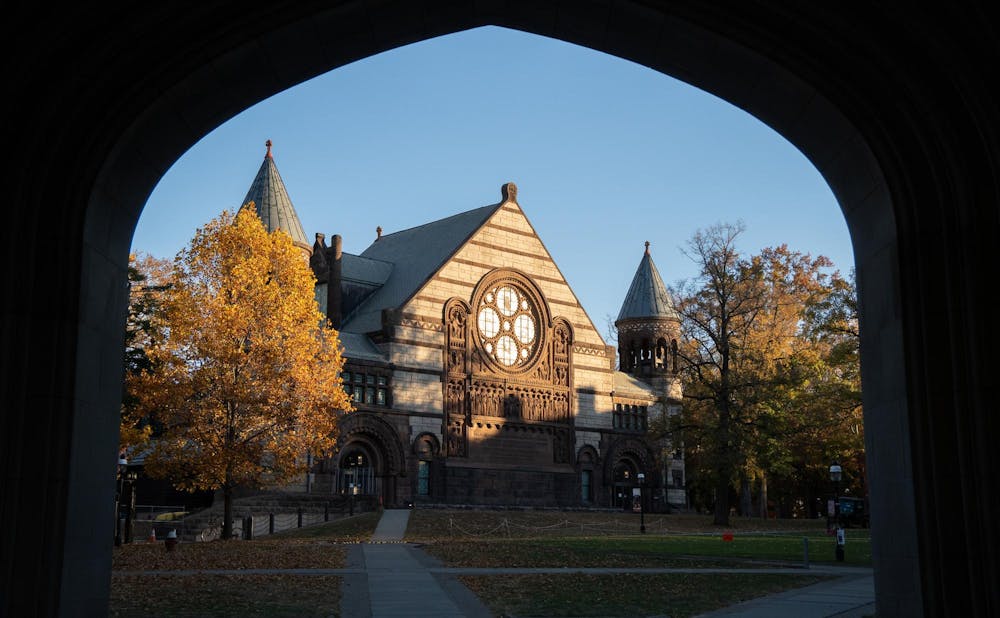At the Nov. 4 faculty meeting, the faculty passed an amendment to the Rules and Procedures of the Faculty by a 124–82–3 vote — the measure introduces remote voting as an option in future meetings. The proposal, brought forward by politics and international affairs professor John Londregan, progressed despite voiced objections from six faculty members.
The amendment is now set to appear for a second vote in front of the entire faculty, according to Londregan.
The proposal, obtained by The Daily Princetonian, reads, “If a measure passes that at least 6 faculty in attendance find objectionable, they can cause it to be presented to the entire faculty via a remote electronic ballot. This would save everyone having to scramble as some of us did on October 21 to attend a surprise meeting.”
The referenced Oct. 21 meeting was not originally scheduled, but the faculty voted to hold a meeting in October at their scheduled September meeting. That meeting had multiple controversial measures on the agenda, including a proposal from Associate Professor of Politics and Public Affairs Jonathan Mummolo that would amend the Rules and Procedures of the Faculty to ban faculty-wide statements on political issues. This is the second time in a month faculty have been asked to vote on measures that would amend the rules.
Two pro-Palestine proposals were introduced by Classics professor Dan-el Padilla Peralta ’06. Padilla Peralta was one of the six faculty who objected to Londregan’s measure. He did not respond to a request to comment in time for publication.
A measure to postpone the votes on the October proposals until the Apr. 28, 2025, faculty meeting from the six-person Faculty Advisory Committee on Policy (FACP), passed with a razor thin margin. Notably, Londregan’s measure only impacts faculty-led proposals, not committee-led proposals like the one from the FACP.
Londregan’s rationale for allowing absentee voting included language that some faculty found controversial. He wrote that the proposal is intended “to leave faculty meetings unaffected for most ordinary business, it creates a ‘fire alarm’ for cases in which an organized minority ambushes the agenda on short notice, mobilizing to pass a controversial measure.”
“Putting it this way implies that people are acting in bad faith,” said Molly Greene, professor of History and Hellenic Studies, in an interview with the ‘Prince.’

“Obviously we can’t call a faculty meeting without following all the procedures, and it took a lot of work to set up the faculty meeting [in May],” she added.
Londregan noted that the faculty opposed to the proposal “thought that the language in the rationale was unduly harsh.” He did not clarify whether the proposal referred to the closed May faculty meeting.
In an email to the Engaged Faculty of Princeton University listserv, comparative literature and African American studies professor Wendy Belcher encouraged faculty to go to the Nov. 4 meeting. The email, obtained by the ‘Prince,’ read “there are concerns that this would constitute a decisive and lasting erosion of governance, perhaps even leading to the end of faculty meetings (If voting can be done in absentia, faculty meetings may become inconsequential).”
Belcher did not respond to repeated requests for comment.

In an interview with the ‘Prince,’ Londregan explained that “the motives for the proposal centered on making things more democratic and making faculty meetings more accessible, for example, to people with children.”
He also noted the challenges of finding a space that could fit the entirety of the faculty. The proposal also addresses this concern: “even when more people find the time to attend, the Nassau Hall common room excludes all but the first 10 or 12 percent of the faculty who show up, something that happened in May 2024 when many faculty were turned away.”
Londregan also mentioned his concern that the entire faculty meeting at once “wouldn't necessarily be conducive to the free and open exchange of ideas.”
The October meeting was held in Richardson Auditorium in Alexander Hall due to large faculty attendance. The Nov. 4 meeting was also held in Richardson, with approximately 200 faculty in attendance.
Olivia Sanchez is an associate News editor for the ‘Prince.’ She is from New Jersey and often covers the graduate school and academic departments.
Associate News editor Miriam Waldvogel contributed reporting.
Please send any corrections to corrections[at]dailyprincetonian.com.








